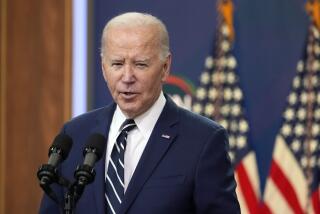Rick Santorum: ‘We have to be concerned’ about the very poor
As new polls show him leading Mitt Romney in the Michigan primary, Rick Santorum visited the Detroit Economic Club and outlined his plan for economic growth, pledging to both cut the entitlements that were “completely consuming revenues” and help the very poor.
The two pledges might seem mutually exclusive, but Santorum, who from the beginning of his campaign has emphasized the importance of two-parent families in economic stability, said that strong families and strong communities would help the poor get back on their feet.
He also pledged to bring back manufacturing to the United States -- although he criticized rival Mitt Romney for supporting the auto bailout -- and said he would open up more of the nation to drilling. He held up a piece of oil-containing rock from North Dakota, which is experiencing an oil boom, and pledged to create jobs like the ones being created there.
Santorum also pledged to propose $5 trillion in spending reductions over five years, while at the same time abolishing the alternative minimum tax and the inheritance tax.
Santorum also made sure to get in a dig at Romney’s well-publicized comment that he wasn’t concerned about the very poor because there is a safety net that will catch them.
“We have to be concerned about those who are the margins of society – the very poor,” he said to a room full of business leaders in suits and ties. “There’s another candidate in this race who suggested he didn’t care about the very poor, who just cares about the 95%. How about a candidate that cares about 100%?”
Though Michigan’s unemployment rate has fallen significantly, to 9.3%, it was the highest in the nation during many parts of the recession, including in 2009, when in August the rate reached 14.1%.
Santorum said he could best help the very poor by freezing entitlements and restructuring them as block grants to states. He also outlined a tax plan that would increase a child tax deduction and create other deductions for healthcare, housing and pensions. He emphasized his role in the 1996 reform of welfare, painting himself as a leader of change while President Obama just wanted to give people food stamps and unemployment benefits.
“If there isn’t anything to stand between you and government, then government becomes your lifeboat,” he said. “When government becomes your lifeboat, freedom is ultimately lost.”
Though he fielded a question from the audience about how he would help the homeless, Santorum targeted his audience, business people, by pledging to lower taxes for innovation and small businesses.
At one point, he even said he was such a strong supporter of successful business, which lifts the rest of the community, that he thought income inequality was a good thing.
“There is income inequality in America, there always has been, and hopefully, there always will be,” he said.
More to Read
Get the L.A. Times Politics newsletter
Deeply reported insights into legislation, politics and policy from Sacramento, Washington and beyond. In your inbox three times per week.
You may occasionally receive promotional content from the Los Angeles Times.







